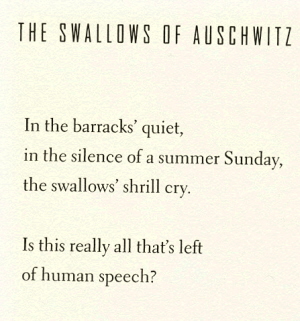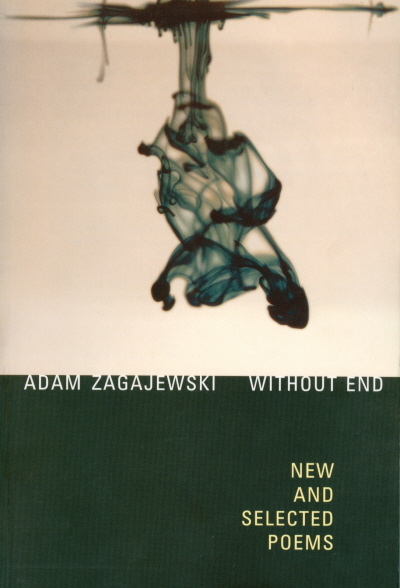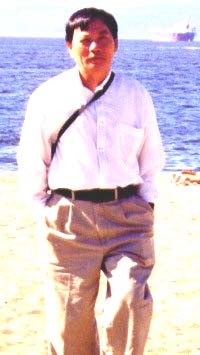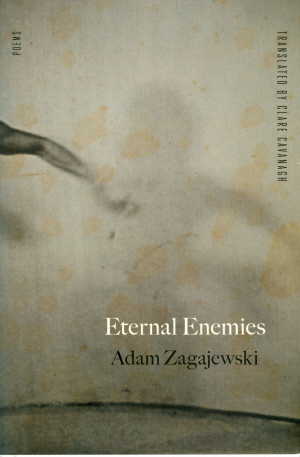Self
Portrait
Subject
Brodsky
Tưởng
Niệm Czeslaw Milosz [1911-2004]
Old
Marx
Our
World
Trong căn phòng nhỏ
Reading Milosz
Greene House
1
2
3
|

OUR WORLD
IN
MEMORIAM W. G. SEBALD
I never met him, I only knew
his books and the odd photos, as if
purchased in a secondhand shop, and human
fates discovered secondhand,
and a voice quietly narrating,
a gaze that caught so much,
a gaze turned back,
avoiding neither fear
nor rapture;
and our world in his prose,
our world, so calm-but
full of crimes perfectly forgotten,
even in lovely towns
on the coast of one sea or another,
our world full of empty churches,
rutted with railroad tracks, scars
of ancient trenches, highways,
cleft by uncertainty, our blind world
smaller now by you.
One Response to “The
Perfect Present for
Sebald Readers
- Ivo Kievenaar Says:
February 8, 2009 at 8:14 am
I just bought: Adam Zagajewski / Eternal enemies, a marvelous
book of poems, Farrar, Straus and Giroux, 2008. One of the poems is
dedicated to W.G. Sebald.
Trang
thơ Adam Zagajewski
Letter from a Reader
Too much
about death,
too many shadows.
Write about life,
an average day,
the yearning for order.
Take the
school bell as your model
of moderation,
even scholarship.
Too much
death,
too much
dark radiance.
Take a look,
crowds packed
in cramped stadiums
sing hymns of hatred.
Too much
music
too little harmony, peace,
reason.
Write about
those moments
when friendship's foot-bridges
seem more enduring
than despair.
Write about
love,
long evenings,
the dawn,
the trees,
about the endless patience
of the light.
Adam Zagajewski
Dịch từ tiếng Ba Lan: Clare Cavanagh
*
Từ một
độc giả Tin Văn
Đen
thui,
Ngoại
trừ
những dòng
Về
BHD
Quá
nhiều về
chết chóc
Quá
nhiều bóng
tối
Hãy
viết về
cuộc đời
một
ngày,
khoảng đó,
khát
khao trật
tự
Adam
Zagajewski
OLD MARX
He can't think. London
is damp,
in every room someone coughs.
He never did like winter.
He rewrites past manuscripts
time and again, without passion.
The yellow paper
is fragile as consumption.
Why does life race
Stubbornly toward
destruction?
But spring returns in dreams,
with snow that doesn't speak
in any known tongue.
And where does love fit
within his system?
Where you find blue flowers.
He despises anarchists,
idealists bore him.
He receives reports from Russia,
far too
detailed.
The French grow rich.
Poland
is
common and quiet.
America
never stops growing.
Blood is everywhere,
perhaps the wallpaper needs
changing.
He begins to suspect
that poor humankind
will always trudge
across the old earth
like the local lunatic
shaking her fists
at an unseen God.
[Eternal
Enemies p.67]
OLD MARX (2)
I try to
envision his last winter,
London, cold and
damp, the snow's curt kisses
on empty streets, the Thames' black water.
Chilled prostitutes lit bonfires in the park.
Vast locomotives sobbed somewhere in the night.
The workers spoke so quickly in the pub
that he couldn't catch a single word.
Perhaps Europe was richer and at peace,
but the Belgians still tormented the Congo.
And Russia? Its tyranny? Siberia?
He spent evenings staring at the shutters.
He couldn't concentrate, rewrote old work,
reread young Marx for days on end,
and secretly admired that ambitious author.
He still had faith in his fantastic vision,
but in moments of doubt
he worried that he'd given the world only
a new version of despair;
then he'd close his eyes and see nothing
but the scarlet darkness of his lids.
-Adam Zagajewski
(Translated,from the
Polish, by Clare Cavanagh.)
[The New Yorker, Jan 21, 2008]
[Eternal Enemies p. 97]
Cụ Mác
Tôi cố tưỏng tượng ra mùa đông
cuối cùng
của ông,
Luân Đôn, lạnh, ẩm.
Tuyết đè ngửa, hôn tàn bạo lên phố vắng, lên mặt nước đen thui của dòng
sông Thames.
Bướm co ro, run rẩy nhóm lửa nơi công viên.
Có tiếng sụt sùi của những đầu máy, ở đâu đó trong đêm.
Những người thợ nói quá nhanh trong tiệm rượu,
khiến ông không kịp bắt, dù chỉ một từ.
Có lẽ Âu Châu thì giầu có hơn, và thanh bình,
nhưng người Bỉ vẫn hành hạ xứ Congo.
Còn Nga xô thì sao? Bạo chúa của nó? Siberia,
chốn lưu đầy ư?
Ông trải qua những buổi tối mắt
dán lên
những tấm màn cửa.
Ông không thể nào tập trung, viết lại những tác phẩm đã xưa, cũ,
đọc lại Marx trẻ cho tới hết ngày,
và thầm lén ngưỡng mộ tay tác giả tham vọng này.
Ông vẫn còn niềm tin ở cái viễn ảnh thần kỷ, quái đản của mình,
nhưng vào những lúc hồ nghi,
ông đau lòng vì đã đem đến cho thế giới,
chỉ một viễn ảnh mới của sự thất vọng, chán chường;
rồi ông nhắm mắt và chẳng nhìn thấy gì nữa, ngoài bóng tối của mí mắt
của mình.
*
READING
MILOSZ
I read your poetry once more,
poems written by a rich man, understanding all,
and by a pauper, homeless, an emigrant, alone.
You always want to say more
than we can, to transcend poetry, take flight,
but also to descend, to penetrate the place
where our timid, modest realm begins.
Your voice at times persuades us,
if only for a moment,
that every day is holy
and that poetry, how to put it, rounds our life,
completes it, makes it proud
and unafraid of perfect form.
I lay the book aside
at night and only then the city's normal tumult starts again,
somebody coughs or cries, somebody curses.
-Adam Zagajewski (Translated from the Polish by Clare Cavanagh)
The New York
Review, 1 March, 2007.
[Eternal Enemies
p. 40]
Đọc Milosz
Tôi đọc thơ ông,
thêm
một lần nữa,
những
bài thơ viết bởi một người giầu có, thông tuệ,
và
bởi một người nghèo mạt hạng, không nhà cửa, di dân, cô độc.
Ông
luôn muốn nói nhiều hơn
chúng
tôi có thể nói,
để
chuyển hóa thơ, để cất cánh,
nhưng
cũng để hạ cánh, dấn sâu vào khoảng đất
nơi
cõi đời của chúng ta, dụt dè, chơn chất, bắt đầu.
Tiếng
nói của ông, nhiều lần, chỉ trong một khoảnh khắc,
khiến
chúng tôi ngộ ra một điều là,
mỗi
ngày, một ngày, mọi ngày, thì thiêng liêng.
và
rằng, thơ, thể hiện điều đó, bằng cách,
quanh
quẩn bên đời ta,
hoàn
tất nó, làm cho nó tự hào, hãnh diện,
và,
đâu cần một dạng hoàn hảo nào, cho thơ.
Tôi
để cuốn sách qua một bên.
Đêm,
và chỉ tới lúc đó, cái xô bồ, thường lệ, của thành phố lại khởi
động,
một
người nào đó ho, hay là, la khóc, một người nào đó, nguyền rủa.
Adam
Zagajewski
STAR
I returned to you years
later,
gray and lovely city, unchanging city,
buried in the waters of the
past.
I'm no longer the student
of philosophy, poetry, and
curiosity,
I'm not the young poet who wrote
too many lines
and wandered in the maze
of narrow streets and
illusions.
The sovereign of clocks and
shadows
has touched my brow with his hand,
but still I'm guided by
a
star by brightness
and only brightness
can undo or save me.
Bài thơ
trên, tả cảnh Gấu trở
về Hà Nội.
Gấu phóng dịch:
Ta trở
về với mi, nửa thế kỷ
sau,
Thành phố xám xịt, đáng yêu,
và chẳng có gì thay đổi
Chôn dưới những con nước của
những con hồ Bẩy Mẫu, Thuyền Cuông, Hồ Gươm, Hồ Tây
Ta đâu
còn là chàng sinh viên
của triết học, của thơ ca, và của tò mò
Cũng không còn là nhà thơ trẻ
viết rất nhiều dòng thơ
và lang
thang trong mê cung
của những con phố hẹp và của
những ảo tưởng
Chúa Cả Ngôi Cao, với những cái
đồng hồ và những cái bóng của nó,
Thò cánh tay xuống, chạm vào lông
mày của ta
Nhưng
ta vẫn được dẫn dắt bởi
một ngôi sao, bởi sự sáng ngời
Và chỉ sự sáng ngời
Là có thể làm lại, hay, cứu vớt
đời ta.
Chúa Cả
Ngôi Cao, là Gấu muốn
nói tới Nhà Thờ Hà Nội, khu Nhà Chung, trường Dũng Lạc... ở kế
bên Bờ Hồ.
Bài thơ, đọc song song với
bài thơ Những con phố sau của Hà Nội,
thì mới đã.
Những con phố
sau của Hà Nội
Nhà trại thui thủi, chẳng cần
Gấu
Và con chó già của Gấu thì lùi lũi chuồn ra khỏi cửa
Chúa biểu Gấu, thôi, hãy về chết ở trong những con phố sau.
Và Gấu tôi không có thể về nhà được nữa.
Gấu thì yêu đến khốn khổ khốn
nạn cái
thành phố quá chớn này.
Nó thì mới dơ dáy, bệ rạc làm sao.
Và làm Gấu nhớ đến những câu chuyện cổ tích ru giấc ngủ ngày nào
Và những âm thanh của con phố làm tim Gấu đau nhói.
Quá nửa đêm, Gấu đi ra ngoài
kiếm một cái
gì đó cho đỡ khổ
Và cái mà Gấu kiếm đó, là danh vọng.
Thế là Gấu đi đến một quán rượu ở những con phố sau.
Nơi ai cũng biết tên Gấu.
Ồn, dơ, say, và, xỉn.
Nhưng chẳng ai độc ẩm ở đó.
Ở những con phố sau của Hà Nội.
Mấy tay bồi riệu mua cuốc lủi cho Gấu,
Mấy chị em ta khóc ròng khi nghe đọc thơ của Gấu
Tim Gấu đập, mỗi lúc một nhanh
thêm
Và Gấu nói với tên say gần bên cửa –
“Ta thì cũng như mi thôi, đời ta là một thảm họa
Và ta không thể trở về nhà được nữa.”
Nhà trại thui thủi, chẳng cần
Gấu, cũng
thui thủi
Và con chó già của Gấu thì lùi lũi chuồn ra khỏi cửa
Chúa biểu Gấu, thôi, hãy về chết ở trong những con phố sau.
Và Gấu không có thể về nhà được nữa.
THE
BACK STREETS OF MOSCOW
Ui chao, hồi này già quá, cơ thể rệu rạo, hệ thống miễn nhiễm hết còn
OK,
thành thử con vai rớt Bắc Kít
hoành hành, đáng sợ thực! NQT
POETRY
Light in the grime
JON STALLWORTHY
Adam Zagajewski
ETERNAL ENEMIES
Translated by Clare Cavanagh
116pp. Farrar, Straus and
Giroux. Paperback, $14. 9780374531607
Adam
Zagajewski's "Try
to praise the mutilated world", first published in the post-September
11
"black" issue of the New Yorker, takes its title from its opening
line:
Try to praise the mutilated
world.
Remember June's long days,
and wild strawberries, drops
of rose wine.
The nettles that methodically
overgrow
the abandoned homesteads of
exiles.
You must praise the mutilated
world.
You watched the stylish
yachts and ships;
one of them had a long trip
ahead of it,
while salty oblivion awaited
others.
You've seen the refugees
going nowhere,
you've heard the executioners
sing joyfully.
You should praise the
mutilated world.
Remember the moments when we
were together
in a white room and the
curtain fluttered.
Return in thought to the
concert where music
flared.
You gathered acorns in the
park in autumn
and leaves eddied over the
earth's scars.
Praise the mutilated world
and the gray feather a thrush
lost,
and the gentle light that
strays and vanishes
and returns.
When I read it I was struck,
first, by an awareness that, far from lecturing his reader, the speaker
was
speaking to himself; his use of "You" (a Zagajewski trademark) a
welcome change from the self-important I-deology of so many
contemporary poets.
It struck me, then, that he had brilliantly obeyed his own imperatives
-
"Remember .... Remember .... Return .... Praise" - and had made me do
the same. More generally, I was arrested by the authority of the voice,
the
courage and wisdom of a call to praise in a time (like any other) of
mutilation: praise, a word with Christian associations, repeated with
increasing urgency in the refrain, acquiring the force of a liturgical
response, a prayer. Behind the distinctive new voice, one can hear a
voice
heard in Auden's "Musée des Beaux Arts" ("About suffering they
were never wrong / The Old
Masters"), juxtaposing "miraculous birth" with "dreadful martyrdom"
in which "the torturer" plays a part. At some level, Zagajewski
remembers this as well as his own love, a fluttering curtain (in a
window Auden
had opened), and a "mutilated world" where "the executioners
sing joyfully". Surely, too, Auden's "expensive delicate ship"
must be one of Zagajewski's "stylish ships" - perhaps one heading for
the "salty oblivion" that awaits Icarus in the Bruegel painting on
which Auden's poem is based.
Zagajewski's praise poem has
the variable line-length of Auden's which, despite its unobtrusive
rhymes,
gives it the easy assurance of the best free verse; and one cannot l
pay Clare
Cavanagh a greater compliment than to say her English poem does not
suffer by
comparison with Auden's. These poems have a similarly antithetical
structure: Auden's
moving from birth to death to life continuing; Zagajewski's, from
"June's
long days" to "light that strays and vanishes / and returns".
They tell us "we must praise" the life continuing, the light
returning. They are both Christian poets, intimately involved in human
tragedy,
yet endowed with the detached perspective of the Old Masters.
Adam Zagajewski was born
sixty-four years ago in Lvov and went
to
university in Cracow,
two cities he loves and celebrates in his essays and poems. He
emigrated to France
in 1982 and now lives between Cracow, Paris and Chicago. Early
collections ( of his poems in English translation were presented in
Without End
(2002) - a title echoing the Book of Common Prayer - with a section of
New
Poems translated by Cavanagh. She has achieved something just as
remarkable with
Eternal Enemies. These are identified in n "Epithalamion", a poem
beginning "Without a silence there would be no music", that goes on
to assert: "Only in marriage do love and time, eternal enemies, join
forces". An earlier poem, "Little Waltz", ends: "love sets
us free, time kills us". The coming together of man and woman is imaged
in
that of the earth and "The Sea",
In love with the earth,
always drawn to shore
….
In love with the earth,
thrusting into cities, Stockholm,
Venice, listening to tourists laugh and chatter
before returning to its dark,
unmoving source.
The most frequent pairing and
dis-pairing of the many antitheses in these
poems are those a of light and darkness (themselves linked to a life
and
death), often in a religious context, as a in "The Churches of
France", described as "dark vessels, where the shy flame of mighty
light wanders". Again, in a more a: recent poem, "At the Cathedral's
Foot",
[we] spoke softly about
disasters,
about what lay ahead, the
coming fear,
and someone said this was the
best
we could do now -
to talk of darkness in that
bright shadow.
Such poems remind us that
when this Polish Roman Catholic Adam was born, "the pock- marked /
Georgian
still lived and reigned". With a bitter parody of the opening of St John's
Gospel, he now
remembers:
In the beginning, freezing
nights and hatred.
Red Army soldiers fired
automatic pistols
at the sky, trying to strike
the Highest Being.
The title of that poem,
"Life is Not a Dream", is echoed by the end of the next, "It
Depends": "I push" through a dense thicket of onlookers and ask:
/ What's happening? God's coming back. But it's just a dream".
Zagajewski resembles Yeats in
the skill with which he links poem to poem, so that the power of both
poets'
collections is greater than the sum of individual poems. The Arch-poet
liked to
quote Blake: "Without contraries is no progression". Zagajewski would
agree but, whereas the Irish agnostic celebrated the conflict of
contraries
that, in his "System", made the world and history go round, the
Christian Pole seeks and celebrates harmony, love: "Remember the
moments
when we were together". The title of a key poem proclaims his creed,
"Poetry Searches for Radiance", the creed of creative artists (made
in their Creator's image) such as Blake-
I watch William Blake, who spotted
angels
every day in treetops
and met God on the staircase
of his little house and found
light in grimy
alleys –
and like others whom he
celebrates: Milosz and Brodsky, Caravaggio and Vermeer, Bach and
Schubert.
Last but not least, the
composers: indeed, Zagajewski would seem to believe that life as well
as art
"aspires to the condition of music". A sentence borrowed from Conrad
Aiken - "Music I heard with you was more than music" - finds its way
into three poems of his new book; and music in some form is the means
of
communication/communion in the joyful epiphanic moments to which he and
his
fellow makers aspire. The music of the translator's English free verse,
in its
happy marriage to the poet's European themes, makes Cavanagh's
Zagajewski as rare
and rewarding an experience as that of Milosz's Englished Collected
Poems.
TLS Dec 4 2009
TLS điểm tập thơ Eternal Enemies,
Những kẻ thù thiên thu, của Adam
Zagajewski.
Chắc
bạn còn nhớ dòng thơ của
Brodsky:
Bao thơ tôi, ít nhiều chi, là
về cùng một điều - về Thời Gian. Về thời gian làm gì con người.
"All my poems are more
or less about the same thing – about Time. About what time does to Man."
Đây là câu trả lời của Adam
Zagajewski:
"Only in marriage do
love and time, eternal enemies, join forces"
"love sets us free, time
kills us".
Adam
Zagajewski
Giáng
Sinh, ngồi nhà đọc chơi vài bài thơ!
NEW YEAR’S EVE, 2004
You're at home listening
to recordings of Billie
Holiday,
who sings on, melancholy,
drowsy.
You count the hours still
keeping you from midnight.
Why do the dead sing peacefully?
while the living can't free
themselves from fear?
Adam
Zagajewski
Đêm Giao Thừa
Bạn ở nhà nghe Duy Khánh ca
Xuân này con không về
Bạn đếm từng giờ,
Chờ cúng giao thừa
Tại sao người chết ca nghe thật
hiền hòa?
Trong khi người sống không thể
nào rũ ra khỏi sự sợ hãi?

ANECDOTE OF RAIN
I was strolling under the
tents of trees
and raindrops occasionally
reached me
as though asking:
Is your desire to suffer,
to sob?
Soft air, wet leaves;
-the scent was spring, the
scent sorrow.
Giai thoại
mưa
Anh lang thang dưới tàng cây
và những hạt mưa thỉnh thoảng
lại đụng tới anh
như muốn hỏi:
thèm gì, ước gì?
đau khổ
hay nức nở?
Trời nhẹ, lá ướt;
-Mùi xuân, mùi buồn
"His
poems celebrate
those rare moments when we catch a glimpse of a world from which all
labels
have been unpeeled."
-Charles Simic, The New York
Review of Books
"Seldom has the muse of
poetry spoken to anyone with such clarity and urgency," wrote Joseph
Brodsky, "as in Zagajewski's case." Without End draws from each of
Adam Zagajewski's English-language collections, both in and out of
print- Tremor,
Canvas, and Mysticism for Beginners-and features new work that is among
his
most refreshing and rewarding. In lucid translations by Clare Cavanagh,
Renata
Gorczynski, Benjamin Ivry, and C. K. Williams, these poems share the
vocation
that allows us, in Zagajewski's words, "to experience astonishment and
to
stop still in that astonishment for a long moment or two."
"These poems enter and
possess you quietly. It is the quiet of a train halted on its lines.
The engine
throbs like a pulse, and there is always music in these verses, or the
echo of
music ... His is the quiet voice at the corner of the immense
devastations of
an obscene century, more intimate than Auden, yet as cosmopolitan as
Milosz,
Celan, or Brodsky."
- Derek Walcott, The New
Republic
"Filled with splendid
moments of spiritual lucidity ... [These poems] transport us into a
realm that
is majestic, boundless and unknown."
-Edward Hirsch, The Washington
Post Book
World
"Zagajewski's poems pull
us from whatever routine threatens to dull our senses, from whatever
might lull
us into mere existence. This is an astonishing book." -Philip Boehm,
The
New York Times Book Review
Những
ngày Noel, Gấu ngồi nhà
“đọc chơi” [chữ của nhà đại phê bình] ba nhà thơ, mong tìm ra cái
chung, và cái
riêng của mỗi người.
Một, nữ thi sĩ Mít, một nữ
thi sĩ và một nam thi sĩ Ba Lan.
Thâu hoạch cũng không tệ.
Adam
Zagajewski
Thơ của
ông ngợi ca những khoảnh
khắc, khi chúng ta thoáng nắm bắt một thế giới mà mọi nhãn hiệu dán lên
nó đều là
nhảm cả.
-Charles Simic, The New York Review of Books
“Thật hiếm hoi, nàng thơ nói,
với bất cứ ai, rõ ràng như thế, khẩn trương như thế, như là trong
trường hợp
Zagajewski,” Brodsky viết. “Không tận
cùng, lọc ra từ những tập có trước đó, có
những tập đã tuyệt bản, như Trémor,
Canvas, Mysticism for Beginners, ngoài ra còn những bài thơ mới,
trong số
những bài tươi mát, hách nhất, bảnh nhất của ông. Qua những bản dịch
thật sáng
suốt của Clare Cavanagh, Renata Gorczynski, Benjamin Ivry, và C. K.
Williams, …
những bài thơ chia sẻ một thiên hướng, nó cho phép chúng ta, qua những
từ của
Zagajewski, ‘kinh nghiệm sự kinh ngạc, và đứng sững trong kinh ngạc,
trong một
khoảnh khoắc, một chốc lát. Hoặc lâu hơn tí nữa: hai chốc lát’.”
Giáng
Sinh, ngồi nhà đọc chơi vài bài thơ!
Một đóng góp
cho ngành thống
kế
Trong số 100 người
những người luôn luôn hiểu biết,
bảnh hơn người khác
- 52 mạng
nghi ngờ, từng bước chân
- gần như hết, số còn lại
vui mừng vì đưa tay ra,
nếu chuyện đó không mất công,
- 49, nhỉnh hơn một tí
luôn luôn tốt
bởi vì không thể làm khác
- 4 đấng, ồ, may ra có thể 5
có thể ngưỡng mộ,
mà không thèm
muốn, hay ghen tị,
-18 mống
đau khổ vì ảo tưởng
tuổi trẻ qua quá nhanh
- 60, hơn, hoặc kém, một tí
không coi nhẹ chuyện đời
- 40 mạng, thêm 4 mạng
luôn sống trong sợ hãi
một kẻ nào đó, hay một chuyện
gì đó
- 77 mạng
có thể hạnh phúc
hai chục, cỡ đó, ở trên đỉnh
từng cá nhân vô hại, hoang dại
giữa đám đông
- nửa con số trên, ít ra là vậy
độc ác khi hoàn cảnh bắt buộc
- tốt nhất, đừng nên biết
dù con số đại khái
khôn ngoan, sau
sự kiện
-
chỉ vài cặp khôn
ngoan hơn trước
chỉ lấy sự kiện từ đời sống
- ba chục
(tôi mong mình lầm)
còng lưng vì nỗi đau
không ánh sáng loé lên trong
bóng tối
- tám muơi ba
sớm hay muộn
ngay thẳng
- ba muơi lăm, vậy là quá nhiều
ngay thẳng và hiểu biết
- ba
đáng thông cảm
- chín mươi ba
ngỏm
- một trăm phầm trăm
con số này cho tới nay chưa
thay đổi
WISLAWA
SZYMBORSKA
[Nobel
văn chương]
Stanislaw
Baranczak
và Clare
Cavanagh
dịch
từ tiếng Ba Lan
Partisan
Review
1998
|



